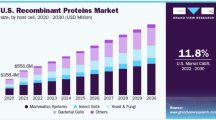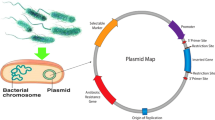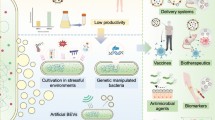Abstract
The IPTG-inducible promoter family, Pgrac, allows high protein expression levels in an inducible manner. In this study, we constructed IPTG-inducible expression vectors containing strong Pgrac promoters that allow integration of the transgene at either the amyE or lacA locus or both loci in Bacillus subtilis. Our novel integrative expression vectors based on Pgrac promoters could control the repression of protein production in the absence and the induction in the presence of an inducer, IPTG. The β-galactosidase (BgaB) protein levels were 9.0%, 15% and 30% of the total cellular protein in the B. subtilis strains carrying single cassettes with the Pgrac01, Pgrac100 or Pgrac212 promoters, respectively. The maximal induction ratio of Pgrac01-bgaB was 35.5 while that of Pgrac100-bgaB was 7.5 and that of Pgrac212-bgaB was 9. The inducible expression of GFP and BgaB protein was stably maintained for 24 h, with the highest yield of GFP being 24% of cell total protein while the maximum amount of BgaB was found to be 38%. A dual integration of two copies of the gfp+ gene into the B. subtilis genome at the lacA and amyE loci resulted in a yield of about 40% of total cellular protein and a 1.74-fold increase in GFP compared with single-integrated strains containing the same Pgrac212 promoter. The capability of protein production from low to high levels of these inducible integrative systems is useful for fundamental and applied research in B. subtilis.
Graphical abstract








Similar content being viewed by others
Data availability
All data generated or analyzed during this study are included in this published article.
References
Castillo-Hair SM, Fujita M, Igoshin OA, Tabor JJ (2019) An engineered B. subtilis inducible promoter system with over 10 000-fold dynamic range. ACS Synth Biol 8:1673–1678. https://doi.org/10.1021/acssynbio.8b00469
Cui W, Han L, Suo F, Liu Z, Zhou L, Zhou Z (2018) Exploitation of Bacillus subtilis as a robust workhorse for production of heterologous proteins and beyond. World J Microbiol Biotechnol 34:145. https://doi.org/10.1007/s11274-018-2531-7
Dong H, Zhang D (2014) Current development in genetic engineering strategies of Bacillus species. Microb Cell Factor 13:63. https://doi.org/10.1186/1475-2859-13-63
Dvorak P, Chrast L, Nikel PI, Fedr R, Soucek K, Sedlackova M, Chaloupkova R, de Lorenzo V, Prokop Z, Damborsky J (2015) Exacerbation of substrate toxicity by IPTG in Escherichia coli BL21(DE3) carrying a synthetic metabolic pathway. Microb Cell Factor 14:201. https://doi.org/10.1186/s12934-015-0393-3
Guan C, Cui W, Cheng J, Liu R, Liu Z, Zhou L, Zhou Z (2016) Construction of a highly active secretory expression system via an engineered dual promoter and a highly efficient signal peptide in Bacillus subtilis. New Biotechnol 33:372–379. https://doi.org/10.1016/j.nbt.2016.01.005
Guérout-Fleury A-M, Frandsen N, Stragier P (1996) Plasmids for ectopic integration in Bacillus subtilis. Gene 180:57–61. https://doi.org/10.1016/S0378-1119(96)00404-0
Härtl B, Wehrl W, Wiegert T, Homuth G, Schumann W (2001) Development of a new integration site within the Bacillus subtilis chromosome and construction of compatible expression cassettes. J Bacteriol 183:2696–2699. https://doi.org/10.1128/JB.183.8.2696-2699.2001
Heravi KM, Watzlawick H, Altenbuchner J (2015) Development of an anhydrotetracycline-inducible expression system for expression of a neopullulanase in B. subtilis. Plasmid 82:35–42. https://doi.org/10.1016/j.plasmid.2015.10.002
Huang K, Zhang T, Jiang B, Yan X, Mu W, Miao M (2017) Overproduction of Rummeliibacillus pycnus arginase with multi-copy insertion of the arg R.pyc cassette into the Bacillus subtilis chromosome. Appl Microbiol Biotechnol 101:6039–6048. https://doi.org/10.1007/s00253-017-8355-9
Kluge J, Terfehr D, Kück U (2018) Inducible promoters and functional genomic approaches for the genetic engineering of filamentous fungi. Appl Microbiol Biotechnol 102:6357–6372. https://doi.org/10.1007/s00253-018-9115-1
Liao C, Ayansola H, Ma Y, Ito K, Guo Y, Zhang B (2021) Advances in enhanced menaquinone-7 production from Bacillus subtilis. Front Bioeng Biotechnol. https://doi.org/10.3389/fbioe.2021.695526
Middleton R, Hofmeister A (2004) New shuttle vectors for ectopic insertion of genes into Bacillus subtilis. Plasmid 51:238–245. https://doi.org/10.1016/j.plasmid.2004.01.006
Ming-Ming Y, Wei-Wei Z, Xi-Feng Z, Pei-Lin C (2006) Construction and characterization of a novel maltose inducible expression vector in Bacillus subtilis. Biotechnol Lett 28:1713–1718. https://doi.org/10.1007/s10529-006-9146-z
Nguyen HD, Schumann W (2006) Establishment of an experimental system allowing immobilization of proteins on the surface of Bacillus subtilis cells. J Biotechnol 122:473–482. https://doi.org/10.1016/j.jbiotec.2005.09.012
Nguyen HD, Phan TTP, Schumann W (2007) Expression vectors for the rapid purification of recombinant proteins in Bacillus subtilis. Curr Microbiol 55:89–93. https://doi.org/10.1007/s00284-006-0419-5
Phan TTP, Nguyen HD, Schumann W (2006) Novel plasmid-based expression vectors for intra- and extracellular production of recombinant proteins in Bacillus subtilis. Protein Expr Purif 46:189–195. https://doi.org/10.1016/j.pep.2005.07.005
Phan TTP, Nguyen HD, Schumann W (2012) Development of a strong intracellular expression system for Bacillus subtilis by optimizing promoter elements. J Biotechnol 157:167–172. https://doi.org/10.1016/j.jbiotec.2011.10.006
Phan TTP, Tran LT, Schumann W, Nguyen HD (2015) Development of Pgrac100-based expression vectors allowing high protein production levels in Bacillus subtilis and relatively low basal expression in Escherichia coli. Microb Cell Factories 14:72. https://doi.org/10.1186/s12934-015-0255-z
Phan T, Huynh P, Truong T, Nguyen H (2017) A generic protocol for intracellular expression of recombinant proteins in Bacillus subtilis. In: Burgess-Brown NA (ed) Heterologous gene expression in Ecoli. Springer, New York, pp 325–334
Saito H, Shibata T, Ando T (1979) Mapping of genes determining nonpermissiveness and host-specific restriction to bacteriophages in Bacillus subtilis Marburg. Mol Gen Genet MGG 170:117–122. https://doi.org/10.1007/BF00337785
Stork DA, Squyres GR, Kuru E, Gromek KA, Rittichier J, Jog A, Burton BM, Church GM, Garner EC, Kunjapur AM (2021) Designing efficient genetic code expansion in Bacillus subtilis to gain biological insights. Nat Commun 12:5429. https://doi.org/10.1038/s41467-021-25691-4
Su Y, Liu C, Fang H, Zhang D (2020) Bacillus subtilis: a universal cell factory for industry, agriculture, biomaterials and medicine. Microb Cell Factories 19:173. https://doi.org/10.1186/s12934-020-01436-8
Titok MA, Chapuis J, Selezneva YV, Lagodich AV, Prokulevich VA, Ehrlich SD, Jannière L (2003) Bacillus subtilis soil isolates: plasmid replicon analysis and construction of a new theta-replicating vector. Plasmid 49:53–62. https://doi.org/10.1016/S0147-619X(02)00109-9
Toymentseva AA, Schrecke K, Sharipova MR, Mascher T (2012) The LIKE system, a novel protein expression toolbox for Bacillus subtilis based on the liaI promoter. Microb Cell Factories 11:143. https://doi.org/10.1186/1475-2859-11-143
Tran DTM, Phan TTP, Huynh TK, Dang NTK, Huynh PTK, Nguyen TM, Truong TTT, Tran TL, Schumann W, Nguyen HD (2017) Development of inducer-free expression plasmids based on IPTG-inducible promoters for Bacillus subtilis. Microb Cell Factories 16:130. https://doi.org/10.1186/s12934-017-0747-0
Tran DTM, Phan TTP, Doan TTN, Tran TL, Schumann W, Nguyen HD (2020) Integrative expression vectors with Pgrac promoters for inducer-free overproduction of recombinant proteins in Bacillus subtilis. Biotechnol Rep 28:e00540. https://doi.org/10.1016/j.btre.2020.e00540
Vavrová Ľ, Muchová K, Barák I (2010) Comparison of different Bacillus subtilis expression systems. Res Microbiol 161:791–797. https://doi.org/10.1016/j.resmic.2010.09.004
Vázquez-Cruz C, Ochoa-Sánchez JC, Olmedo-Alvarez G (1996) Pulse-Field gel-electrophoretic analysis of the amplification and copy-number stability of an integrational plasmid in Bacillus subtilis. Appl Microbiol Biotechnol 46:55–60. https://doi.org/10.1007/s002530050782
Watzlawick H, Altenbuchner J (2019) Multiple integration of the gene ganA into the Bacillus subtilis chromosome for enhanced β-galactosidase production using the CRISPR/Cas9 system. AMB Express. https://doi.org/10.1186/s13568-019-0884-4
Xiang M, Kang Q, Zhang D (2020) Advances on systems metabolic engineering of Bacillus subtilis as a chassis cell. Synth Syst Biotechnol 5:245–251. https://doi.org/10.1016/j.synbio.2020.07.005
Yang H, Ma Y, Zhao Y, Shen W, Chen X (2020) Systematic engineering of transport and transcription to boost alkaline α-amylase production in Bacillus subtilis. Appl Microbiol Biotechnol 104:2973–2985. https://doi.org/10.1007/s00253-020-10435-z
Yomantas YA, Abalakina EG, Golubeva LI, Gorbacheva LY, Mashko SV (2011) Overproduction of Bacillus amyloliquefaciens extracellular glutamyl-endopeptidase as a result of ectopic multi-copy insertion of an efficiently-expressed mpr gene into the Bacillus subtilis chromosome. Microb Cell Factories 10:64. https://doi.org/10.1186/1475-2859-10-64
Yu X, Xu J, Liu X, Chu X, Wang P, Tian J, Wu N, Fan Y (2016) Identification of a highly efficient stationary phase promoter in Bacillus subtilis. Sci Rep 5:18405. https://doi.org/10.1038/srep18405
Zhang L, Wei D, Zhan N, Sun T, Shan B, Shan A (2020) Heterologous expression of the novel α-helical hybrid peptide PR-FO in Bacillus subtilis. Bioprocess Biosyst Eng 43:1619–1627. https://doi.org/10.1007/s00449-020-02353-1
Zhou C, Ye B, Cheng S, Zhao L, Liu Y, Jiang J, Yan X (2019) Promoter engineering enables overproduction of foreign proteins from a single copy expression cassette in Bacillus subtilis. Microb Cell Factories 18:111. https://doi.org/10.1186/s12934-019-1159-0
Funding
This work was partially funded by Vietnam National Foundation for Science and Technology Development (NAFOSTED) under Grant Number 106-NN.02–2015.24. The funding agencies had no role in the design, execution, or interpretation of this work. Phuong Thi Bich Chu was funded by Vingroup Joint Stock Company and supported by the Domestic PhD Scholarship Programme of Vingroup Innovation Foundation (VINIF), Vingroup Big Data Institute (VINBIGDATA), code VINIF.2020.TS.29.
Author information
Authors and Affiliations
Contributions
HDN, TTPP and WS conceived the research and designed experiments. PTBC, TTTN and TTTT conducted experiments. PTBC, HDN analyzed data. PTBC, HDN and WS wrote the manuscript. All authors read and approved the manuscript.
Corresponding authors
Ethics declarations
Conflict of interest
The authors declare that they have no conflict of interest.
Ethics approval
Not applicable.
Consent to participate
Not applicable.
Consent for publication
Not applicable.
Additional information
Publisher's Note
Springer Nature remains neutral with regard to jurisdictional claims in published maps and institutional affiliations.
Rights and permissions
Springer Nature or its licensor (e.g. a society or other partner) holds exclusive rights to this article under a publishing agreement with the author(s) or other rightsholder(s); author self-archiving of the accepted manuscript version of this article is solely governed by the terms of such publishing agreement and applicable law.
About this article
Cite this article
Chu, P.T.B., Phan, T.T.P., Nguyen, T.T.T. et al. Potent IPTG-inducible integrative expression vectors for production of recombinant proteins in Bacillus subtilis. World J Microbiol Biotechnol 39, 143 (2023). https://doi.org/10.1007/s11274-023-03566-8
Received:
Accepted:
Published:
DOI: https://doi.org/10.1007/s11274-023-03566-8




